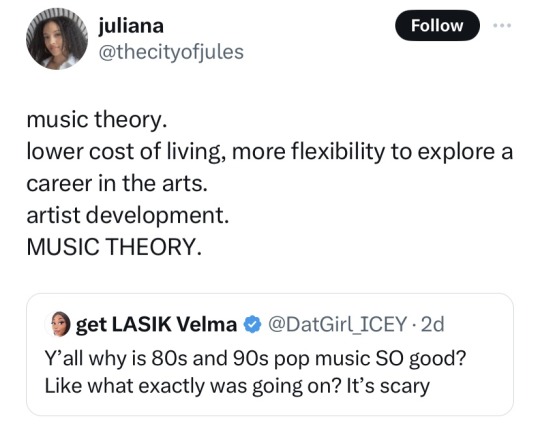#Music theory
Explore tagged Tumblr posts
Text
ok, little rant about a use of a leitmotif in les mis that i think has slipped under most people's radars!
so you the know the police leitmotif? the "tell me quickly what's the story/who saw what and why and where/let him give a full description/let him answer to javert!" tune that appears whenever somebody gets arrested?
now turn your ear to javert's suicide, specifically the "i am reaching but i fall/and the stars are black and cold" part. it took me a while to notice, but this whole section of the song is just a snippet of the arrest leitmotif:


but he never completes it. the snippet repeats and repeats. try as he might, he finds himself unable to sing the same old song of Justice and Law and Righteousness and Order. he's like a jammed cassette player spitting out the same second of music over and over and over and over again, unable to follow his old ways, but unable to let them go. he's stuck, but he will keep throwing himself against the walls of the cage.
javert is desperately trying to run on his old tracks of thought, but, as vicky h puts it, he experiences "the derailment of a soul, the shattering of an integrity irresistibly propelled in a straight line and dashed against God".
: )
1K notes
·
View notes
Text
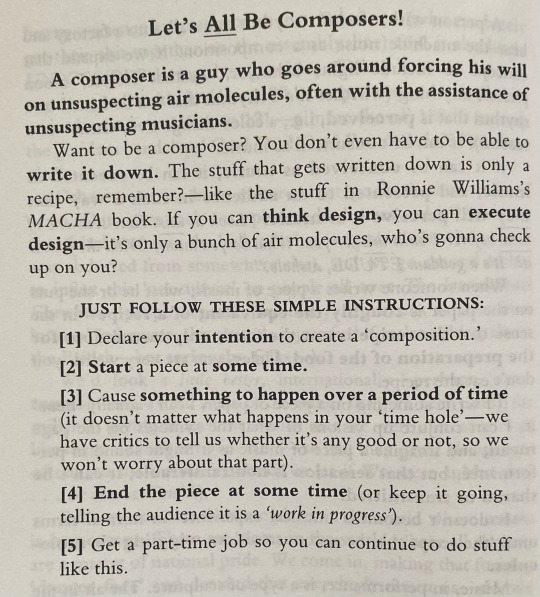
3K notes
·
View notes
Text

not so fun wicked fact i noticed while doing my music coursework
at the end of popular, glinda’s big ‘as meeeeeee’ moment is sung in the key C5
when elphaba sings ‘its meeee’ during the climax of defying gravity, it is also a C5.
the note consistently reoccurs as a grounding for her in the melody, such as when she makes big statements like quoting the wizard back to himself in ‘everyone deserves the chance to fly’
she also uses that specific note when glinda joins the ending, singing ‘i hope your happy’ (obviously a C5) in the lyric ‘me down’ (elphaba also sings a C5 here)
AND WHAT IS THE FINAL NOTE IN CYNTHIA’S ICONIC RIFF?? A C. MOTHER FUCKING. 5.
glinda is always a source of comfort for elphaba in the second half of this movie, and throughout defying gravity is just begging elphaba to stop. in order to defy gravity, she has to let go of her grounding and let glinda go.
the final c5 is what i would class as her farewell to glinda.
but as we see in act 2 or part 2, they can never truly be rid of eachother. elphaba will always return to that grounding note, even if she has to turn away while singing it
yeouch
#wicked#elphaba thropp#wicked elphaba#glinda upland#glinda the good witch#wicked glinda#cynthia erivo#ariana butera#ariana grande#wicked part one#wicked for good#the wizard of oz#the wicked witch of the west#music theory#wicked theory#defying gravity#popular wicked#put me in therapy please
321 notes
·
View notes
Text







music theory diagrams (& a guidonian hand)
from a composite manuscript containing various works on music theory (by guido of arezzo, hermann of reichenau, theogerus of metz, and others). southern germany, late 12th c.
source: Kassel, LMB, 4° Ms. math. 1
#12th century#music theory#medieval music theory#guidonian hand#mnemonics#guido of arezzo#hermann of reichenau#theogerus of metz#medieval manuscripts
301 notes
·
View notes
Text
No but it's not just that Mariah and Joey do a perfect job at selling this scene

It's that literally everything is lining up to make us the audience think there's a very real chance Peter might die.
It's that a Hatchetfield musical has literally never let their happy couple survive the end of the show. Why should these two be any different?
It's that the Lords in Black are deadly. Linda was killed in two different timelines after becoming one's ambassador. They absolutely have the power to make this happen. This wouldn't event be the first time they got someone shot in the head.
It's that the "I'm not a loser" leitmotif has been played directly before Richie dies (sung) and Ruth dies (in the accompaniment). And then they sing it right before this scene!!
It's that the "I'm not a loser" motif itself is just an exaggerated Dies Irae, AKA the musical representation of death, and Pete is the one who first introduced the motif.
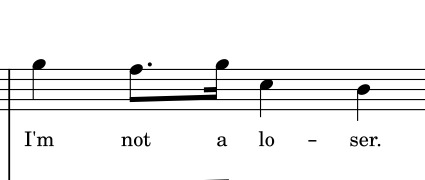

(and once again, they sing it right before this scene!)
It's that you don't even consider Max saving him as a possibility because why would he want to stop this? He wants Pete dead. In the chaos of the moment, you don't stop to think about how letting Pete die would kill him too.
It's that everything lines up so perfectly and then as a cherry on top Joey and Mariah are delivering these lines like their lives depend on it.
It's just so fucking devastating.
#nerdy prudes must die#lautski#pete spankoffski#stephanie lauter#joey richter#mariah rose faith#npmd#hatchetverse#hatchetfield#starkid#music theory#jeff blim
2K notes
·
View notes
Note
do you have any fun facts about music theory?
There are several important music theories:
There are five elements of music: Melody, Rhythm, Harmony, Form, and Milla Jovovich.
Music is considered a "Liberal Art" because it's often very idealistic but does nothing to prevent the threat of fascism.
The existence of ELO and ELP suggest that there will one day be a band called ELQ.
Phrygian modal music can refer to three different modalities, none of which can be comprehended by anyone, ever.
A "tritone" is an interval that covers three whole tones, and that means it is the work of Satan and people actually believed that.
There is an instrument called a "Mouth Organ" that cannot be played because nobody can stop giggling when they think of it.
No one person could have written all the works attributed to Wolfgang Amadeus Mozart, therefore he was really the Earl of Oxford and slept with Queen Elizabeth.
That part of "Cults of the Shadow" by Therion at 3:15 where it goes like da da da du du du du du du and then that one riff hits and then choir starts behind it is fucking EPIC.
409 notes
·
View notes
Text
youtube
long but fascinating video. the basic criticism is p much spelled out in the thumbnail there: Western music that labels itself 'Persian', 'Arabic', 'Egyptian' etc or serves as soundtracks for Middle Eastern settings is always a mishmash of wildly geographically separated regional elements that almost exclusively refers back to other Western orientalist music, but passes itself off as the real thing enough that most people have no idea what, say, Iranian music actually sounds like. it's certainly true... but the really interesting part for me is the details: Faraji breaks down the stereotypical elements of that orientalist style (the Armenian duduk, melodies that walk up and down the double harmonic major scale, a certain very specific vocal style) and describes what's missing (e.g. the many more common modes of Iranian music which use microtonal quarter tone steps, the complex ornamented articulations, the specific 'accents' of different regions) and in a fascinating bit, makes a similar mishmash of regions applied to Europe to make a parody 'Scottish' song which honestly kinda slaps. he's also got a pretty good analysis of where this stuff comes from in the affordances of Western instruments and VSTs - it's nearly impossible to play microtonal music on a guitar or piano, and Western musicians don't really learn how to do it
I don't have much to add besides 'interesting video!' but I'll definitely be using this channel a bit in the next big music theory post I'm cooking up (which will mainly be about trying to understand the process of composition). he's got another long video on Iranian music theory too and I'm looking forward to checking it out...
612 notes
·
View notes
Text
found a cut song from march of the falsettos

263 notes
·
View notes
Text
Not gonna lie, the fact that Odysseus sang Penelope's and Telemachus' names without the melody for the first time the whole musical kind of broke me a little.
#epic the musical#odysseus#epic#Penelope#Telemachus#music theory#i may have cried#underworld saga#epic underworld saga
630 notes
·
View notes
Text
WHY YOU LIKE THIS SONG
664 notes
·
View notes
Text
Thinking once again about how Nobuo Uematsu and Masayoshi Soken are both completely amazing composers but in completely opposite directions let me explain
Disclaimer I am not a music theorist; most of music theory is black fucking magic to me. I barely know what a chord is and the circle of fifths makes me quake as though before an Elder God. I just really like both of their works and sometimes I have thoughts about things. Also this is all just my opinion, it's fine if you don't agree, etc.
So: Uematsu is first and foremost, in my opinion, an absolute master of melody. I believe it's what makes his work so iconic and makes so many of his pieces so instantly recognizable. The Final Fantasy theme, the chocobo theme, Dancing Mad, Vamo'alla Flamenco, fucking One-Winged Angel--Just from seeing those names, you've probably got one playing in your head already. You could start humming it right now. Maybe you are already.
And it makes perfect sense when you consider the era he was working in, because back in the 8-bit and 16-bit era, the melody was all you had. When you have such a tiny amount of storage space to work with, you can really play only one, maybe two notes at a time. You can't do anything that's layered, because you only have one layer to work with. I think that's why so much video game music from that era is so memorable and iconic. It's not just because you played so much Street Fighter II when you were a kid that the music is indelibly seared into your brain (though that probably doesn't hurt); it's also because Yoko Shimomura wrote really solid melodies that had nothing else competing for your aural attention (apart from the in-game sound effects, which are probably also seared into your memory). (Yoko Shimomura, btw, also composed the music for Final Fantasy XV, the entire Kingdom Hearts series, and like 50 other games over the past 40 years, another fucking icon).
But back to Uematsu: like I said, melodic genius. Even when his work is upscaled into full orchestral arrangements, that core melody is always front and center. And his affinity for melody makes even more sense when you consider that before he got into video game composing, he was writing commercial jingles. (Younger folks may not be aware, but there was a time when practically every product had to have its own theme song, and the best ones were short, snappy, and instantly memorable--and for that, again, you need a strong, simple melody. Ba da ba ba ba, I'm lovin' it.)
Compare: Soken. Soken only started at Square 12 years after Uematsu, which isn't that long in human terms (to me at least, cos I'm old), but it is a long fuckin' time in video game years. By the time he started composing for games, there was so much more you could do with game music in terms of layering, complexity, and sound, and you can tell from his work that he takes full advantage of that. His work is complex and dense, a rich layer cake of themes and motifs, all beautifully merging and weaving together, often to extraordinary effect.
And again, if you look at his pre-music career, it makes a lot of sense that he'd have that approach to music, because he first got into the games industry as a sound designer; I believe that he is the sound director for all the FFXIV expansions, as well as being the composer. So of course he'd be very aware of not just how a sound (or piece of music) works on its own, but of how it fits into the greater whole, and of how to layer and balance lots of different sounds to create something greater than the sum of its parts. And of course it makes sense that he'd bring that approach to his compositions as well.
As a consequence of this approach, though, his music often lacks the memorable melodies that characterize Uematsu's work. Like, I ground (grinded?) Dun Scaith a lot the last time it was on the Mogstone rotation, I know all the boss themes extremely well and can recognize each of them instantly. But if you asked me right now to hum one? I don't think I could. (This isn't a deficiency, to be clear; music doesn't need a prominent core melody in order to be good.)
And that's also not to say that all his music lacks iconic melodies. His vocal tracks, pretty much by definition, have to put a single melody front and center; and then on top of that (or rather, behind it), you have all that trademark Soken richness and depth. Which is probably also why his vocal tracks go so fucking hard.
I think that's also why, out of all the expansions, I like Heavensward's music the best. Most of Heavensward's score is written by Soken, but the main theme is Uematsu's, and you may notice it's basically a tasting menu of like 5 or 6 excellent, very recognizable melodies, one right after the other. And basically every piece on the Heavensward soundtrack incorporates one or more of these melodies. So it really does give you the best of both worlds, and gives the overall score a cohesion that I don't see as much with the other expansions.
TL;DR, Uematsu and Soken are both amazing composers with very different and complimentary styles that reflect their differing backgrounds and the different eras of games in which they have worked and I just think that's neat.
#masayoshi soken#nobuo uematsu#ffxiv#final fantasy xiv#final fantasy#rambling into the void#music#music theory#video game music#yoko shimomura
136 notes
·
View notes
Text
fun little bit of musical symbolism i noticed in les mis: try tapping out the rhythm of "do you hear the people sing". hear that? it's a heartbeat! perfectly fitting for a song about passion - enjolras' (cool, sexy) passion for the revolution, and marius' (boring, straight) passion for cossette. i'm almost certain that it's deliberate.
194 notes
·
View notes
Text
Friends, allies, foes...I know we've had our differences in the past but please let us work together today to beat our common enemy.
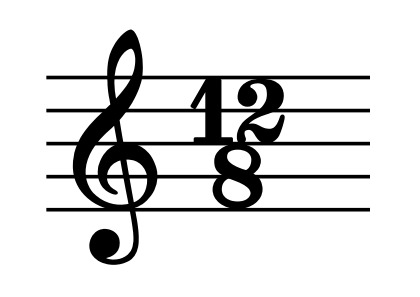
205 notes
·
View notes
Text
What is the hotest diatonic mode?
74 notes
·
View notes
Text
I don't know much about music theory but here is something I have made and that I'm definitely right about.
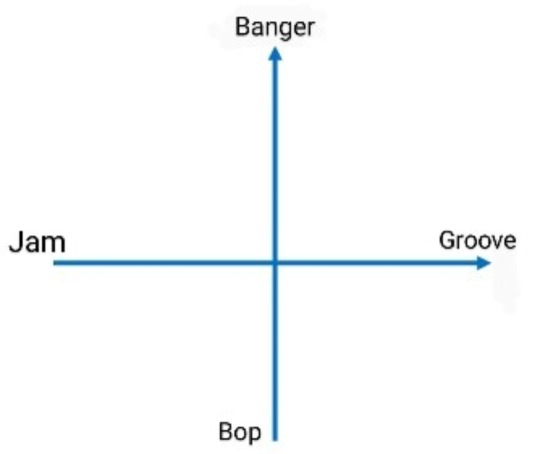
Obviously correct as it is, I still feel compelled to provide further explanation. See below:

Okay? Okay. Good. Please feel free to contribute- if we all add something to the chart we can get this whole music thing completely squared away in no time.
Here you go, I've started this one:

433 notes
·
View notes
